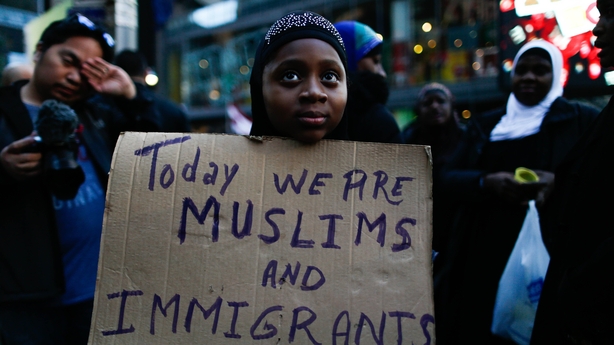US President Donald Trump and other leaders whose policies "demonise" entire groups of people pose a growing danger for the world, Amnesty International has said in its annual report.
"The poisonous politics of demonisation" are making the world "more fragmented, more unequal (and) more unsafe", Amnesty chief Salil Shetty said while presenting the 2016 report in Paris.
In its report, which evaluates the state of human rights in 159 countries, it says "divisive fear-mongering has become a dangerous force in world affairs."
It adds: "More and more politicians calling themselves anti-establishment are wielding a toxic agenda that hounds, scapegoats and dehumanises entire groups of people."
Mr Shetty pointed to President Trump, Turkish President Recep Tayyip Erdogan, Philippine President Rodrigo Duterte and Hungarian Prime Minister Viktor Orban as leaders employing "us versus them" rhetoric.
Their brand of identity politics is causing a "global pushback" of human rights and undermining a coordinated response to mass atrocities, Amnesty said in the report.
"We have reached a point where there is no longer any red line. Almost no action has become too appalling or indefensible," Mr Shetty said.
In this new reality it's easy to imagine a dystopian future where unrestrained brutality becomes a new normal.
He said that last year the world "ceased to be shocked by the deliberate bombing of hospitals and schools in conflict zones."
But while acknowledging "the parallels that many are drawing between the present time and 1930s Europe," Mr Shetty said, "we must not be fatalistic."
He called on "leaders, but especially people, to stand up against the politics of demonisation".

Mr Shetty denounced the Trump administration's attempted travel ban as inhumane, illegal and "just plain stupid... because what it's doing is making all of us, not just people in the United States, less safe."
The Executive Director of Amnesty International Ireland, meanwhile, said that 2016 was a "very dark year".
Speaking to RTÉ’s Morning Ireland, Colm O'Gorman said 36 countries violated international law last year by sending refugees back to a country where their rights were at risk.
Mr O'Gorman said people are free to vote for whomever they please but elected leaders must respect the rule of law.
He said that the attitude of Irish people was positive and that their approach needed to be reflected in how the Government behaved in the international arena.
"If there is a positive note, coming out of what was a very dark year in 2016," said Mr O'Gorman, "it's the mobilisation of people in an effort to resist this kind of rhetoric, to resist this kind of politics of hate, of division and disrespect for human rights, disrespect for those values.
"That's the positive note."
Housing, abortion and Travellers' rights raised in Irish section
In its section on Ireland, Amnesty International said Travellers' rights to adequate housing were violated.
The shortage of State housing and private rental accommodation contributed to homelessness, it said.
It also raised concerns about the access to and information about abortion, which it said remained "severely restricted and criminalised".
The poor living conditions in "direct provision" centres for asylum seekers was also a point of concern in the report.

